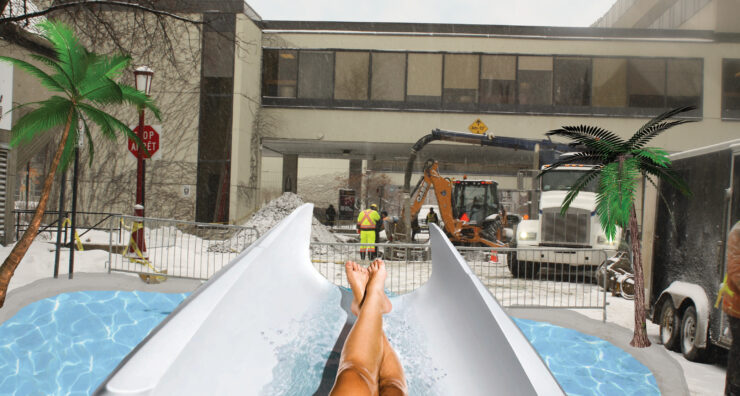Questions raised about transparency in SFUO finances and budget
The most recent Student Federation of the University of Ottawa (SFUO) Board of Administration (BOA) meeting focused on the SFUO’s financial situation for the 2016-17 year.
The Aug. 16 meeting began with updates from each member of the SFUO executive. Vice-president social Hadi Wess spoke about this year’s 101 Week, highlighting the fact that due to the SFUO’s financial situation, there was no budget for the week. Wess said that this year money for the event will come from sponsorships with companies and banks.
Motion to go in-camera for financial report fails
Following these updates, the board motioned to present the comptroller general’s report of the SFUO’s expenditures.
Comptroller general Tanner Tallon motioned to present the report in-camera, which led to concerns from a number of board members who raised the question of transparency.
Faculty of Sciences representative Nick Robinson said it is “undemocratic” and “absurd” for students to not know where their money is going, while Faculty of Arts representative Erin Chapman said that if the SFUO believes in transparency, they should not be hiding numbers from the public.
In response to these concerns, members of the SFUO executive said that because the numbers were not yet official, they were hesitant to make them public.
“It’s bad practice to release unofficial numbers to the public,” said Francesco Caruso, vice-president of services and communications.
SFUO president Roméo Ahimakin said that it was preferable to go in-camera for the presentation of the comptroller general’s report to protect “sensitive information” as well as the SFUO itself.
Vice-president of university affairs Vanessa Dorimain also noted that the comptroller general’s report would be released to the public. The report has not been released as of the date of this publication.
The motion to go in-camera failed, and Tallon presented his findings publicly.
Comptroller general’s report highlights areas of concern
Tallon’s report highlighted four areas of interest, the first being taxi chits, or receipts, used by SFUO executive members this past year.
According to Tallon, taxi usage by SFUO executive members was significantly higher than in previous years, with two members using a combined total of $1,820.64 in taxis in the past year.
Tallon highlighted that “the most concerning part about the usage over the past two months is that most of the taxi chits … almost exclusively by two members, have been used to shuttle between the executive’s house and events, with less than half being used outside of normal business hours.”
The findings represent a 428 per cent increase in executive taxi usage from 2014-15 to 2015-16, or a $1,000 increase from the summer of 2015.
Secondly, Tallon discussed a $330 charge for a single room at the Delta hotel in downtown Ottawa for one night, for the purpose of an SFUO executive retreat.
“Whereas this would not normally be an issue, spending $330 on a hotel room within the city of Ottawa is excessive given our current cash flow situation,” said Tallon.
The third item in the report pertained to a tab which members of the SFUO used at the Pivik convenience store, when they had forgotten their wallet and could not pay. This was “not seen as okay” by Pivik manager François Lavigne.
Following a series of meetings to discuss solutions to this issue, the SFUO executive proposed a discount system which was later implemented.
“The discount is the same as the Pivik staff receive. There are two concerns I would like to flag. First is financial impact to the business,” said Tallon, mentioning that the discount for SFUO executives resulted in a $1,000 loss for Pivik. “In perspective, the Pivik only made $7,000 last year.”
Tallon’s second concern was that this discount was only applied to SFUO executive members, while other business staff, such as those from 1848, along with others employed by the SFUO, did not receive this discount.
The fourth item which Tallon addressed in his report dealt more with “the financial controls of the (SFUO).”
Tallon also noted that this audit should be taken more seriously than it had been in previous years.
“Some of the items and issues that are currently affecting the federation could have been prevented or adequately prepared for should the auditor’s report have been taken more seriously,” said Tallon.
Tallon then listed a number of recommendations to the SFUO as a result of these issues, including the implementation of a taxi usage policy along with the upkeep of a finance journal by the president, vice-president of finances, and vice-president of communications.
SFUO executives question comptroller general’s findings
In response to Tallon’s report, Rizki Rachiq, vice-president of finances, said that some numbers presented were not accurate, while Wess questioned if Tallon had interviewed the SFUO executive about his findings, or if these were merely assumptions.
Tallon confirmed that he did not interview any of the SFUO executive about his findings.
In regards to the taxi chits, Wess said that just because a taxi was paid for under an executive’s name, it does not mean that the executive had used the taxi. For instance, the taxi could have been used to take an intoxicated 101er home during 101 Week.
Ahimakin also addressed that some members of the SFUO executive do not live close to campus—two members live in Barrhaven, while another lives in Gatineau. Wess said that finding a way home after a night event during 101 Week is impossible, considering that most transit systems do not operate as late as 2 a.m.
In response to Ahimakin’s comments, Chapman said that the SFUO executive gets paid for their work, while most students who volunteer as guides for 101 Week are not paid, and still find their way home after night events.
Finally, to address the hotel expenditure, Rachiq said that the large room was booked so that six people (the entirety of the SFUO executive) could meet and discuss business matters.
Following these statements, executive members informed the BOA that they would be taking the comptroller general’s recommendations seriously, and Caruso thanked the BOA for holding the SFUO accountable.
SFUO 2016-17 budget presented in-camera
After a 10-minute recess, Rachiq moved to present the budget for the 2016-17 year. There was another motion to go in-camera, which again raised concerns from board members about democracy and transparency between the SFUO and the public.
“Being undemocratic and not transparent is the opposite of what we are trying to do,” said Caruso. He then confirmed that the budget would be released online via the SFUO website and potentially over social media.
As of Aug. 23, the 2016-17 budget has not been posted online.
The motion to go in-camera then passed, and the budget was presented. It was later adopted publicly after the in-camera session.
The next BOA meeting will be held on Sept. 18 at 1 p.m. in Tabaret Hall, room 083. Meetings are open to the public.








